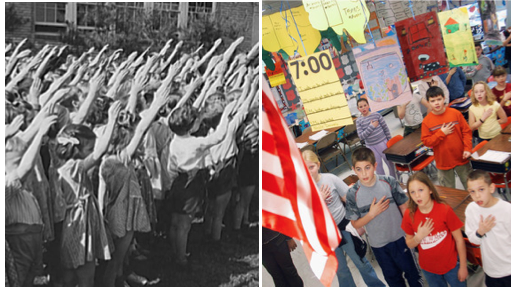CommentsTHE ISENBERG FILE-Lord Action said, "Power corrupts and absolute power tends to corrupt absolutely." I would argue that if one is unquestioningly required to pledge allegiance to the flag of the United States irrespective of what the political leadership and others do in derogation of our constitutionally guaranteed rights, then what we have lost is the real value of the laws and rights our democracy stand for.
At the core of any real democracy is the notion that you don't need to prioritize protecting the rights of the majority because they can take care of themselves. Rather, you protect the rights of the minority. Our Founding Fathers understood that the greatest strength of any democracy lies in the protection of ideas that might be unpopular. This is what makes it possible to continue society’s evolution, something that is necessary if we want to remain a democracy where all ideas -- popular or unpopular -- are allowed to be part of the ongoing public dialogue about where we are going as a free country.
While there are limits on 1st Amendment rights when it comes to speech, association, and beliefs – i.e. yelling fire in a theater is not protected speech – athletes’ symbolic speech by kneeling on one leg during the national anthem in no way represents a clear and present danger to the nation. Rather, it expresses the justifiable frustration of intelligent minorities in this country who know that they remain mostly segregated in society, even though Supreme Court decisions such as Brown vs. Board of Education declared unequal treatment illegal 63 years ago.
This past week marked the 60th anniversary of the supposed integration of the Topeka Kansas High School in 1957 and yet not only are most Kansas schools and others around the country still de facto segregated, but under President Donald Trump and his Department of Education head Betsy DeVos, there are states ready to even more radically re-segregate their public schools.
The hallmark of American democracy has always been the enshrined right of our citizens to question the authority of their government. In this context, is kneeling on one leg such a radical means to express those rights that are guaranteed by the Constitution and the Bill of Rights, and represented symbolically by the flag?
Sadly, over the years, our government has sometimes violated stated rules that are contained in the Constitution and has challenged our ability to question authority. One example of this is that, in the many years since 1941 when Congress declared war on the Japanese after they bombed Pearl Harbor, we have fought many other undeclared wars without the Congressional approval required by the Constitution.
We as citizens have suffered infringement on our privacy facilitated by 21st century technology. This has made every American’s right to privacy unenforceable. And the Supreme Court’s decision in Citizens United, allowing unlimited political campaign contributions to be made by corporate “personhoods,” has, more than any prior decision, threatened the checks and balances our Founding Fathers so diligently built into the U.S. Constitution to avoid what Lord Acton warned against: the corruptive potential of power.
So, here’s the bottom line: When does blindly saying the pledge of allegiance start to look like Germans saying Heil Hitler?
(Leonard Isenberg is a Los Angeles, observer and a contributor to CityWatch. He was a second generation teacher at LAUSD and blogs at perdaily.com. Leonard can be reached at [email protected]) Edited for CityWatch by Linda Abrams.
-cw
















